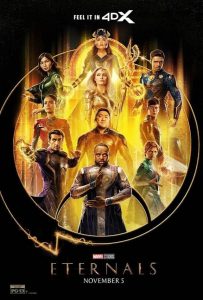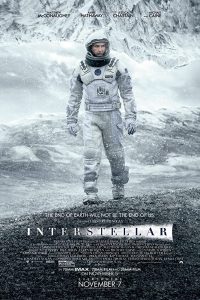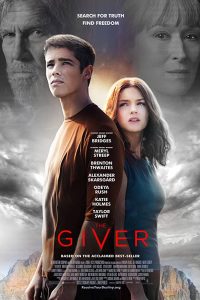Bad Robots: Arley Sorg and Josh Pearce Discuss Eternals
 Thousands of years ago, the godlike Celestial Arishem (voiced by David Kaye) sent a squad of immortal, humanoid Eternals to Earth to hunt down alien monsters called Deviants, and to provide humanity with guidance and assistance in developing civilization, from Babylon all the way through to the modern world.
Thousands of years ago, the godlike Celestial Arishem (voiced by David Kaye) sent a squad of immortal, humanoid Eternals to Earth to hunt down alien monsters called Deviants, and to provide humanity with guidance and assistance in developing civilization, from Babylon all the way through to the modern world.
In the present day, believing that the Deviants were eliminated 500 years earlier, the Eternals mostly settle into human-seeming lives, getting jobs, falling in love, hiding their powers — the usual — until a Deviant shows up in downtown London and everything they thought they knew about their mission is revealed to be false.
Arley: For me, it was a perfectly fine movie. It was good. Not great, it wasn’t amazing, but the visuals, a lot of the combat sequences, and some of the core concepts were cool. There were storytelling techniques that weren’t working for me, but once it was pointed out to me that this movie has a lot of Wuxia flavor, it kind of shifted the lens a little bit. Like, “Okay, well, it’s not working for me, but it might work for a lot of other people.”
Josh: That’s a really good point about the framing of expectations, because I went into this with no expectations, other than that it’d contain a lot of the standard Marvel beats, which it didn’t, really. And I was extremely bored for the first hour —
Arley: It’s a long-ass movie.
Josh: I didn’t really engage with the movie until Arishem’s explaining the mission, and it becomes this bizarre ’70s pulp sci-fi thing. They’re out in space, the ships are weird triangles, the visuals are really cool, and everything is clockwork. Reminded me of that Raised by Wolves show, this kind of sci-fi pulp that I’m not sure if I like it, but I’m fascinated by how weird it is (though I do also take issue with its cosmological model). Everything else, on either side of that middle chunk, felt like a Roland Emmerich movie, which I did not enjoy.
Arley: So in other words, you were interested when it started getting science fictional. The problem here is that you’re looking at it as a science fiction movie, but it’s a comic book movie.
Josh: I mean it literally opens with a spaceship, so it is pretty science fiction*. And we do write these reviews for a science fiction magazine, so it’s probably worth pointing out the SF elements, and if they work. (Which they don’t.) But are people expecting standard Marvel fare? Because I don’t know if it succeeds on that level, either. You’re a Marvel fan. Did you like this as a Marvel comic movie?
Arley: Okay, but it’s comic book science fiction, which is often kind of ridiculous if held up for scrutiny. You know, radiation giving people superpowers, for example, instead of cancer. If you are used to comic book science fiction, there’s nothing here that will take you out of the experience. I would call it a decent movie. I do think that you have a really good point, that the person who goes to see a lot of Marvel movies probably does expect something different than what this movie is delivering, but I don’t think they’re gonna hate it. It isn’t gonna thrill comic book readers that much, ’cause it won’t quite scratch the itch for comic book fans, but it won’t offend them.
Eternals is a sharp contrast to Chloé Zhao’s Oscar-winning Nomadland, which was an intimate, small-scale character story. Zhao knows how to frame a shot, and Eternals is at least a visually interesting film, but all the things that made Nomadland work are missing here: emotional connection, social commentary, humans.
Josh: I gasped out loud when David Strathairn dropped Frances McDormand’s plates in Nomadland. I don’t think I had a reaction to any character interaction in Eternals.
The Eternals are a large RPG party to keep track of: there’s the healer/leader Ajak (Salma Hayek), the tank Gilgamesh (Don Lee), illusionist Sprite (Lia McHugh), mind control creep Druig (Barry Keoghan), engineer Phastos (Brian Tyree Henry), super-speedy Makkari (Lauren Ridloff), paladin Thena (Angelina Jolie), ranged-attack Kingo (Kumail Nanjiani), Ikaris (Richard Madden, he can fly), and our main character focus, Sersi (Gemma Chan).
When Eternals reband to fight the resurgent Deviants, Sersi deals with a newfound mantle of leadership, strives to find confidence in her own powers, and faces some stark choices between her past with Ikaris and her love for mere mortal Dane Whitman (Kit Harington).
Josh: All the flashing back and forth between the modern day and the past was interrupting the plot, kind of making it drag, and really doing a disservice to both halves of the story.
Arley: So much of it is really about explaining the idea of the movie. I probably would have been more invested if they had spent more time on giving the characters their own kind of arcs, especially considering we’re talking about thousands of years, instead of spending so much time just reiterating the central idea. There’s maybe three characters that have their wants really spelled out — one of them is the kid and she isn’t really acting on it. She wants to grow up, but the “immortal kid” thing has been played to death. Interview with the Vampire immediately comes to mind. It would be so easy to sprinkle in character arcs for at least three or four more characters. You could show the Sprite trying to get people to fall in love with her. You could show Phastos saying he’s sick of people but then doing things to try to engage with humans and engage with the idea of them as valuable.
Josh: For such a big-name cast, all the acting was terrible, except for Brian Tyree Henry as Phastos. Everyone else was so wooden, and there was no chemistry between anyone. Ikaris goes up to Sersi and says, “I’ve loved you for thousands of years. I’m yours if you’ll have me.” Then she turns around, and then they’re having sex on the beach. That didn’t convince me at all that they had any sort of feelings towards each other. I get that they’re immortal and alien*, but there’s literally no humanity in this movie.
Arley: I actually wondered if Zhao was going for performances and emotional delivery which is closer to Chinese cinematic styles, and if this batch of actors just couldn’t quite pull it off. The gay dudes, though, they saved the movie for me! I loved everything about them and their family.
Josh: Kumail Nanjiani is a very good comedic actor, but his character was so out of place with the rest of the tone of the movie. That dance sequence went on for ten minutes. At some point I go, “Okay, we get the joke. Can we move on with these characters?”
Arley: I mostly liked the humor in this, I felt like I needed the humor. We’ve talked before about how sometimes, when the humor just falls on one character, it doesn’t work as well as if you spread the humor around a little bit.
The plot is fairly trope-laden. We’ve seen the immortal guardians thing already in The Old Guard. (Yes, yes, we know — the Eternals comics came first, but it wasn’t an original idea even back then.) And, like the History Channel’s Ancient Aliens, human progress is reduced to extraterrestrial meddling, which undercuts all scientific reasoning, trial and error, hard work, and sacrifice that generations of humans have actually done. No, humans can’t do anything on their own. It’s aliens*.
Arley: It totally matches the idea of these characters being mythical creatures. So many mythologies have, like, “Oh, we got writing from this god.”
Josh: Right. Promethean.
Arley: Yeah. Thoth invented writing, Shennong taught humans agriculture, and so on. Here they tried kind of half-assedly to be like, “Oh, well, if we give humans this, then they’ll develop the rest on their own.” But the film could have at least had a specific example or two of actual human invention. “Well, this person invented this,” or, “Oh, the humans are contributing to their own story in some way.” It could’ve been a piece of human connection in a story that basically had almost no human involvement.
The film also makes an attempt to explain why the Eternals haven’t interfered in great tragedies like Thanos’s arrival in Avengers: Infinity War, or in purely human matters like world wars, genocides, etc. To do so, they say, would prevent humans from developing into what they are now (much like Star Trek‘s Prime Directive), and war is the great driver of technological progress, a viewpoint which is both incredibly cynical, and arguable. (If your real goal was to increase the human population as much as possible, you wouldn’t be fomenting wars. You’d show everyone how to wash their hands.)
Josh: Stuff can be terrible science fiction, or even science fantasy, or just flat out fantasy, fine. But if it impedes the progress of the story, then it becomes a problem.
Arley: Yeah, it makes me think about the Godzilla movies and how that’s totally fake science fiction, but a lot of people are not going to care about it. A lot of people who watch Godzilla movies are used to terrible science fiction, and a lot of people who watch superhero movies are used to a lack of thorough interrogation. My bigger concern was: if Thanos is snapping his fingers and half the people die —
Josh: Here come spoilers!
Arley: — that fucks up the Celestials’ plans! Why don’t the Celestials appear and be like, “Yo, that shit ain’t cool”? (Which, in the comic books, they do.) If they feed on intelligent life, and somebody wipes out half their food source, that should become important. It wasn’t just a problem on Earth, it was universal.
Though their mission requires them to be detached and impartial to human fate, some of the Eternals eventually decide that the Earth is worth saving because of humans’ indomitable will to live and/or love — the same corny and cheesy (and anthrocentric) trope used in everything from Interstellar to The Fifth Element to Starman and countless others. Arishem’s final declaration that humans will be judged by the Eternals’ experience of them is essentially the entire arc of Star Trek: The Next Generation. Is it really believable that out of all the other species in the well-populated Marvel universe, the Eternals have never encountered any other that displayed similar traits (and therefore convinced the Eternals to abandon their mission)? Are we really that special?
So Eternals feels familiar, even as it emphasizes the alien. You know these names, you know the myths. The movie certainly isn’t groundbreaking.
Josh: In a literal sense, not until the very end, at least. There was one thing I was fully expecting this movie to do, that it didn’t, that I was hoping it would do. They were showing the Deviant becoming more and more human as he absorbed all these powers, and I thought the Eternals were going to team up with him once they realized he’s not the actual villain. The Deviants are not villains. Rather than fighting the people alongside you, you should fight the people above you. But nope, Thena just chopped him up with a sword. There was an opportunity to do something almost more Star Trek, like finding a common ground with your enemy. But it just, again, boiled down to punching a CGI monster in the face.
Arley: That’s the bottom line of most Marvel movies. Punching CGI. We have to accept that as a foundational thing.
Josh: We can push them to do better.
Arley: I was really trying to understand the filmmaking choice of killing the Deviant, trying to line it up in terms of gender. This is a female director, but the film, for me, reads as somewhat misogynistic. The women are defined in terms of who they love. The most badass woman has to be controlled physically by a male and is completely sidelined. So I was trying to reconcile the Deviant’s death as, is this the director’s way of making Thena a more relevant and powerful character? Maybe there’s something that the director was going for, but it didn’t quite come across for me.
Josh: I found the Deviant to be the most relatable character.
Arley: I’ve always loved the Celestials. Starfox is one of my favorite Eternals and they don’t introduce him till the end. The whole time, I’m like, “Where the fuck is Starfox?” Basically if you like the Eternals, so much that you like about them is not at play in this. I’m just excited to see Celestials and I want to see Galactus show up and start some wild shit.
Josh: You’ll probably get your wish. They keep trying to make a Fantastic Four movie, which I always associate directly with Galactus. Plus this next phase of Marvel heroes is going to need a big bad guy to fight in their eventual crossover movies — where do you go from Thanos? Who’s a bigger threat?
Arley: Galactus!
(*They’re also alien robots.)
Directed by: Chloé Zhao
Written by: Chloé Zhao, Patrick Burleigh, Ryan Firpo & Kaz Firpo, based on the comics by Jack Kirby
Starring: Gemma Chan, Richard Madden, Angelina Jolie, Salma Hayek, Kit Harington, Kumail Nanjiani, Lia McHugh, Brian Tyree Henry, Lauren Ridloff, Barry Keoghan, Don Lee, Harish Patel, Bill Skarsgård, Haaz Sleiman, Esai Daniel Cross & Harry Styles (yes, that Harry Styles)

JOSH PEARCE has stories and poetry in Analog, Asimov’s, Beneath Ceaseless Skies, Cast of Wonders, Clarkesworld, IGMS, Nature, and more. Find him on Twitter: @fictionaljosh, or at fictionaljosh.com. One time, Ken Jennings signed his chest.
ARLEY SORG, Senior Editor, has been part of the Locus crew since 2014. Arley is a 2021 World Fantasy Award finalist for his work as co-Editor-in-Chief at Fantasy Magazine. He is also Associate Editor and reviewer at Lightspeed & Nightmare magazines, columnist for The Magazine of Fantasy and Science Fiction, and interviewer at Clarkesworld Magazine. He grew up in England, Hawaii, and Colorado, and lives in Oakland, CA. A 2014 Odyssey Writing Workshop graduate, he can be found at arleysorg.com – where he has started his own “casual interview” series with authors and editors – and on Twitter (@arleysorg).
 While you are here, please take a moment to support Locus with a one-time or recurring donation. We rely on reader donations to keep the magazine and site going, and would like to keep the site paywall free, but WE NEED YOUR FINANCIAL SUPPORT to continue quality coverage of the science fiction and fantasy field.
While you are here, please take a moment to support Locus with a one-time or recurring donation. We rely on reader donations to keep the magazine and site going, and would like to keep the site paywall free, but WE NEED YOUR FINANCIAL SUPPORT to continue quality coverage of the science fiction and fantasy field.
©Locus Magazine. Copyrighted material may not be republished without permission of LSFF.







